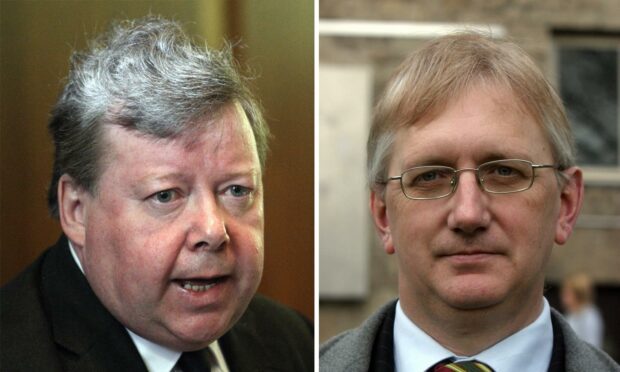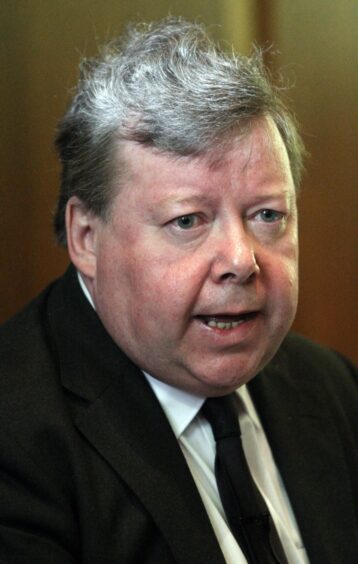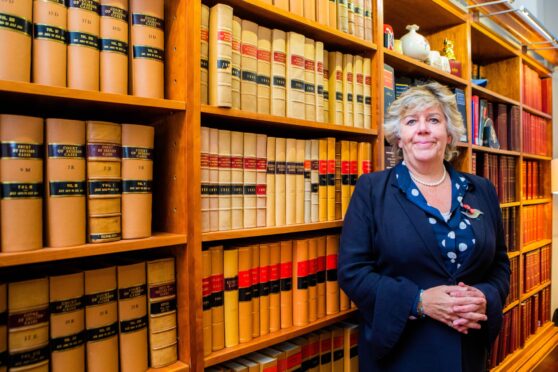A former Dundee University Rector who created “serious risks” to alleged victims in the trial of Alex Salmond has lost a legal challenge against a contempt of court prison sentence.
Craig Murray wanted the finding of contempt quashed, along with an eight-month jail term imposed last year.
Murray ignored court rules around identifying complainers in such cases while writing his blog reports on the trial.
Scotland’s senior judge said “arrogant” Murray – who drank Champagne with supporters outside the police station before handing himself in to go to prison – had deliberately ignored the rules to push his “conspiracy” theory and pointed out the former diplomat was not a journalist.
He said in the atmosphere around the trial, “there was a real danger” the women would be “physically harmed” through Murray outing them.
Murray spent half his sentence in prison after he was found to have acted in a way judge Lady Dorrian described as striking at “the heart of the administration of justice”.
A specially-convened bench of five judges at the Court of Appeal in Edinburgh has now rejected Murray’s challenge against both the finding and the sentence.
Scotland’s senior judge, the Lord Justice General Lord Carloway said: “The petitioner (Murray) is an intelligent person whose actions were deliberate and calculated.
“They clearly showed contempt for the court’s order and for the rule of law.
“They created serious risks for the complainers’ mental and physical health.
“Notwithstanding the petitioner’s personal circumstances, but taking into account his apparent total lack of remorse, and perhaps insight, in relation to the consequences of his actions, the court is unable to conclude that a sentence other than one of imprisonment would have been appropriate.”
Murray not a journalist
He said: “It is one thing to maintain and disseminate a view that allegations against Mr Salmond were a criminal conspiracy engineered by the First Minister and to face any consequences of so doing.
“It is quite another to subject other persons, whether identified or identifiable, to the risk of abuse and to having their dignity and privacy invaded in a manner which the courts strive to protect.”
Murray had published information on his blog about women who gave evidence at the trial of Mr Salmond at the High Court in Edinburgh where he was acquitted of sexual offences.
An order was passed at the outset of the criminal proceedings against Mr Salmond prohibiting the publication of material identifying alleged victims.
Lord Carloway said Murray, the UK’s former ambassador to Uzbekistan, attempted to portray himself as a journalist “in new media”.
The senior judge said: “This is unconvincing.
“A journalist is a person who writes or edits a newspaper or periodical; whether in hard copy or online.
“The petitioner is not such a person, nor is he an NGO or campaign group.
“An individual does not become a journalist merely by publishing his or her thoughts online, whether by operating a website, running a blog or tweeting.
“If it were otherwise almost everyone would be a journalist.
“That is not the case.”
‘Substantial arrogance’
Murray had claimed the imposition of imprisonment was excessive and the judges heard he had been willing to pay a fine.
Lord Carloway said the mainstream media appeared to have no problem in abiding by the practice of not publishing information liable to identify an alleged victim in a sex case.
The judge, who heard the case with Lady Paton, Lord Woolman, Lord Pentland and Lord Matthews, said journalists have responsibilities, notably over the accuracy of the information they report.
He said Murray did not have an editor and seemed to find it “extremely difficult to distinguish between comment, conjecture and face”.
The Lord Justice General said the contempt committed by Murray was of “very great gravity”.
He added: “The petitioner deliberately set out to publish information likely to lead to the identification of the complainers and did so.”
“Displaying what some might describe as a substantial degree of arrogance, he elected to circumvent the law, which permits the court to prohibit the disclosure of the identity of complainers (or the publication of information likely to lead to identification) in sexual offence cases, and the existing universal press convention of not revealing these identities, simply because in his mind, he knew best.”
‘Real danger of physical harm’
Lord Carloway said the trial of Mr Salmond was an extremely high profile event and feelings were running high between his supporters and others.
He said: “The revelation of the identities of the complainers would be likely to result in considerable abuse and harassment (particularly on social media) against them.
“There was a real danger that they would be physically harmed.”
Mr Salmond was cleared of all charges at the end of the 2020 trial.













